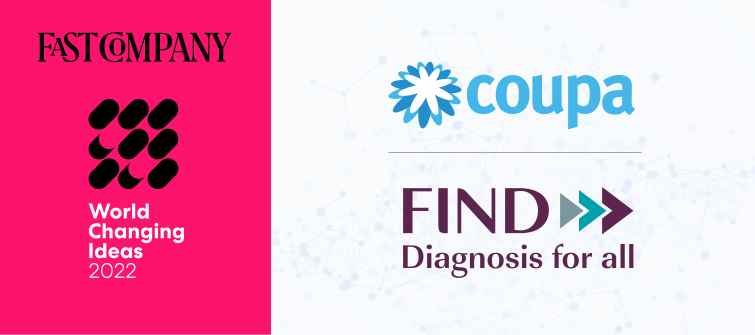Coupa and FIND Recognized by Fast Company for a World Changing Idea

Imagine having to travel more than 90 kilometers (55 miles) to access a simple blood or fluid test that could save infant and adult lives. In many lower and middle income countries, this is how far many people have to go to get tested for HIV.
Globally, about one-third of infants who have been exposed to HIV haven’t been tested, even though testing is a first, critical step to getting proper, timely treatment. For infections ranging from HIV to tuberculosis (TB), effective treatments are available, but it’s hard to treat what hasn’t been diagnosed. And in places where many people don’t have easy access to diagnostic testing and where the systems themselves are fragile, the stakes are high.
But what if you approached diagnostic testing networks like supply chains?
This question helped launch a partnership between FIND, the global alliance for diagnostics, Coupa, and the USAID Global Health Supply Chain Program-Procurement and Supply Management (GHSC-PSM1) project, to create OptiDx2. OptiDx is a publicly available, open-access, easy-to-use web tool that helps low- and middle-income countries (LMICs) improve diagnostic testing networks to help achieve universal health coverage goals and improve patient care through better access to testing.
At Coupa, we believe this can change the world for the better, and are thrilled to share that OptiDx has been recognized by Fast Company as a finalist for a World Changing Idea3!
Coupa and FIND recognized by Fast Company’s World Changing Ideas for OptiDx
Coupa and FIND share a vision to make healthcare more accessible to all, including diagnostic services. This partnership began in 2017 and OptiDx launched officially in 2020. Since its conception, OptiDx technology has been used by Ministries of Health in India, Vietnam, Zambia, Burkina Faso, and Bangladesh across a range of diseases, including TB, HIV, hepatitis C, and COVID-19.
OptiDx has demonstrated the power of data driven decision-making as it helps countries achieve greater efficiency in their diagnostic networks, reductions in time from test to diagnosis, and improvements in access to testing and health outcomes.
We are inspired knowing our technology is being used in these innovative ways to make tangible improvements in human health and wellbeing around the world.
Applying supply chain design and planning technology to diagnostic networks
Like supply chains, diagnostic networks need to balance supply and demand, source and procure tests, and run logistics for test samples. They need to know where their clients, communities, and patients are, and they need to deliver goods and services to them. Diagnostic network optimization can help countries identify gaps in their services and understand how to fill those gaps.
Historically, diagnostic network planning, especially in LMICs, relied on manual methods and expert knowledge. But important data were often missing or not easily applied into these plans. OptiDx uses Coupa’s supply chain digital twin technology, which creates a replica of their physical networks, and allows users to explore multiple, customized scenarios. These scenarios are then analyzed using Coupa’s world-class network and transportation optimization algorithms to improve access to diagnostic services and make service delivery more cost-effective.
For example, in Zambia, the model informed by OptiDx showed an optimized network could shorten the distance patients had to travel for HIV tests by a factor of 10, from 98km all the way down to 10km. This helped increase the proportion of individuals tested onsite from 10% to 48%. And for TB tests, the average distance people traveled decreased from 11km down to 7km.
How diagnostic network optimization can work
OptiDx is built on Coupa’s supply chain design and planning App Studio software and is tailored specifically for diagnostic network design in a LMIC context. It leverages existing sources of country-specific data, such as testing statistics, case-notification reports, population data, geographic parameters, and epidemiological and demographic surveys. OptiDx lets the user run a series of customizable scenarios to determine which one will most improve access to services, while optimizing cost efficiency. Healthcare planners in these countries can make strategic, efficient, and data-driven decisions to improve network flows, laboratory testing processes, and ultimately get more patients diagnosed and treated.
Harnessing technology for better global health outcomes
An accurate diagnosis is the necessary first step to treat many diseases. As more countries build diagnostic network models and explore scenarios that help identify service solutions using OptiDx, more patients will gain access to timely diagnostic testing from a network that will be optimally designed to meet current needs, and also to grow and adapt as the network and health situation evolves over time.
We are honored to be named as a finalist for Fast Company’s World Changing Ideas awards! And we’ll keep striving for a better world.
OptiDx was developed through a partnership between Coupa; FIND, the global alliance for diagnostics; and the USAID Global Health Supply Chain Program-Procurement and Supply Management (GHSC-PSM) project. Funding is provided through a grant from the Bill & Melinda Gates Foundation. Hosting and maintenance is supported by the U.S. President’s Emergency Plan for AIDS Relief (PEPFAR) via the USAID GHSC-PSM project.
Sources:
1 Procurement and Supply Management, USAID Global Health Supply Chain Program.
2 OptiDx, 2021.
3 17 ways technology is making an impact in the developing world, Fast Company Staff, Fast Company, 3 May 2022.